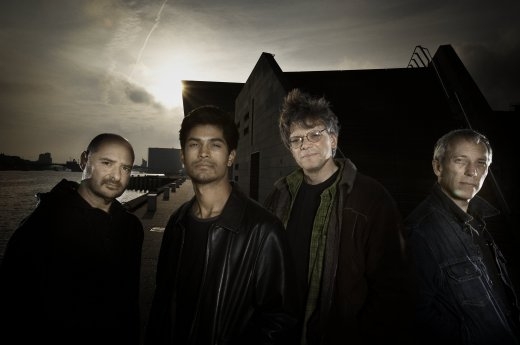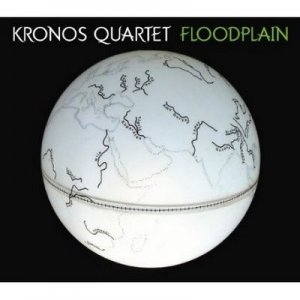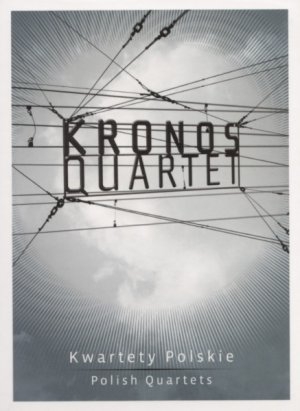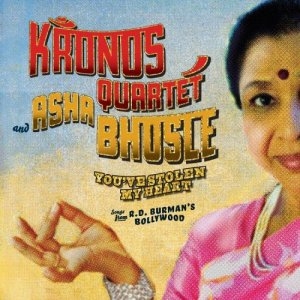
[Photograph by Jeppe Gudmundsen-Holmgreen]
 BY DAVE ALLEN Any discussion of modern American music, especially in the last 30 years, has to start with the Kronos Quartet. But thanks to their efforts as commissioners and promoters of vital new work, both by composers from the US and all over the world, the discussion doesn’t end there. With their dedication to touring, recording and continuing to take on exciting and ground-breaking work, the Kronos Quartet have earned a spot in the pantheon — not just in classical music, not just in world music, but purely as musicians. I spoke with David Harrington, founder and first violinist for the Kronos, catching him en route to San Francisco International Airport, where he would later fly to New York for the premiere of Tan Dun’s “A Chinese Home” at Carnegie Hall. This premiere builds on a concentration on world music also exemplified by the recent album “Floodplain,” which assembles both indigenous and modern music from the great river cultures in Iraq, Egypt, India, Lebanon, Ethiopia and elsewhere. We discussed adopting the music and techniques of foreign cultures, the expansion of the standard string quartet with additional instruments and singers, and how Philadelphia’s own George Crumb, a musical legend himself, spurred the Quartet to become what they are.
BY DAVE ALLEN Any discussion of modern American music, especially in the last 30 years, has to start with the Kronos Quartet. But thanks to their efforts as commissioners and promoters of vital new work, both by composers from the US and all over the world, the discussion doesn’t end there. With their dedication to touring, recording and continuing to take on exciting and ground-breaking work, the Kronos Quartet have earned a spot in the pantheon — not just in classical music, not just in world music, but purely as musicians. I spoke with David Harrington, founder and first violinist for the Kronos, catching him en route to San Francisco International Airport, where he would later fly to New York for the premiere of Tan Dun’s “A Chinese Home” at Carnegie Hall. This premiere builds on a concentration on world music also exemplified by the recent album “Floodplain,” which assembles both indigenous and modern music from the great river cultures in Iraq, Egypt, India, Lebanon, Ethiopia and elsewhere. We discussed adopting the music and techniques of foreign cultures, the expansion of the standard string quartet with additional instruments and singers, and how Philadelphia’s own George Crumb, a musical legend himself, spurred the Quartet to become what they are.
PHAWKER: Why do an album like this now? Is there something in the culture — I’m thinking of Yo-Yo Ma’s Silk Road Project — that’s bringing us to explore these parts of the world’ Is it something political?
DAVID HARRINGTON: If you go back and listen to any of the many pieces we’ve commissioned in 36 years, it will be very clear that the thing that the Kronos Quartet has done is to try to bring the world into the music we play. In the early days, I didn’t know any music from Iraq, Iran, Afghanistan or Egypt. I had no way of communicating with composers in those places. So when I started this group, from a group of very close friends, there’s been a kind of specialization in commissioning and working with composers from many parts of the world.
“Floodplain,” like all of our albums, took a long time to put together. We commissioned the first string quartet from  an African composer in 1984, but it took eight years to assemble the album that became “Pieces of Africa.” “Floodplain” started at the very beginning of the time when Bush, Cheney and Rumsfeld were plotting the invasion of Iraq, and then I became a grandfather for the first time in January 2003. For me, this created a real sense of polarity of emotions. There was this dread and fear of what was about to happen, and this absolutely joyful expression of a new member of my family. That was the seed in mind of what became “Floodplain,” about six years later.
an African composer in 1984, but it took eight years to assemble the album that became “Pieces of Africa.” “Floodplain” started at the very beginning of the time when Bush, Cheney and Rumsfeld were plotting the invasion of Iraq, and then I became a grandfather for the first time in January 2003. For me, this created a real sense of polarity of emotions. There was this dread and fear of what was about to happen, and this absolutely joyful expression of a new member of my family. That was the seed in mind of what became “Floodplain,” about six years later.
PHAWKER: For you, is there the same sense of ownership with music from other cultures as there is with music from Western traditions?
DAVID HARRINGTON: Well, I started playing string music at age 12, and I only knew Beethoven, Mozart, Haydn, Schubert… I was a teenager from Seattle, and here I was playing music from guys from Vienna from 150 years ago or more. There’s always been a sense in playing music like this, like for “Floodplain,” that if you’re not equipped, that if you do it, it’s not going to ring true. Well, I didn’t go to Vienna until the 1980’s, and by that time, I’d played all the music Berg and Webern. I think all music is an extension of the imagination. It allows us windows into other cultures and other ways of thinking. Every piece of music does that.
PHAWKER: It’s still very different, though, in terms of notations, techniques, and tuning systems. How do you prepare to take on this type of music?
DAVID HARRINGTON: The first thing I would do is attempt to get as much sonic information as possible. There was a lot of Iraqi pop music into the 1970’s, and an album of it came out a few years ago. I’d been waiting for that to come along. All of a sudden there was something that grabbed me, and we fashioned our take on a pop song that came our way.
PHAWKER: The Quartet has been working with samples and electronic music since at least “Different Trains” (Steve Reich’s landmark string quartet, reflecting on Holocaust themes) and now with “Tashweesh,” the piece by Ramallah Underground on “Floodplain.” How have you adapted to it and made it part of your style?
DAVID HARRINGTON: I first heard Ramallah Underground on Myspace, and for a year or so, I thought, ‘this is so interesting.’ I recognized this collective that was doing something that sounded like no other music I was aware of. We had to figure out a way for them to write music for Kronos. They sent a number of different possibilities, and the track that chose was “Tashweesh.” You notice there’s environmental sounds at the start, and that’s a man selling perfume on the streets of Ramallah. I love that the sounds that surround them enter their music. I thought it was an important element to add to our work and to bring those kinds of immediate sounds into the concerts that we play. Other pieces where that has occurred… “Nuevo” has all kinds of elements of Mexico, “Doom. A Sigh” on “Black Angels” has these amazing voices of mourning women. For me, I always respond to the sound… what grabs me and magnetizes me.
PHAWKER: Many of the pieces of “Floodplain” go beyond the standard string quartet instrumentation — Wu Man playing electric sitar, you playing the Indian shruti box. Is this necessary for the survival of the genre?
 DAVID HARRINGTON: You have to realize that the inspiration for starting Kronos was hearing “Black Angels” by George Crumb on the radio one night. I didn’t realize it was a string quartet because of the sound of it. When you think about what he accomplished in that piece, he reinvented the entire medium with that piece. For me, in music, all sounds are available. I don’t feel constricted by my choice of instrument. Just because I was nine years old and chose the violin to bring me into the world of music doesn’t mean that I have to feel restricted.
DAVID HARRINGTON: You have to realize that the inspiration for starting Kronos was hearing “Black Angels” by George Crumb on the radio one night. I didn’t realize it was a string quartet because of the sound of it. When you think about what he accomplished in that piece, he reinvented the entire medium with that piece. For me, in music, all sounds are available. I don’t feel constricted by my choice of instrument. Just because I was nine years old and chose the violin to bring me into the world of music doesn’t mean that I have to feel restricted.
We just recorded and performance with these Javanese musician, and he brought me this 100-year old gong from Java. That is going to be in my music room for years. The sound of it is so beautiful, I feel so lucky every time I play it, and I want to use it in our recordings, because I want everyone to hear this sound. As for the shruti box, it was used by Indian singers to practice ragas. Now it’s kind of a throwback instrument, but what I love about the one that I play on “Raga Mishra Bhairavi” is that it’s almost like an accordion or a harmonium, and we felt it would be a good addition to what Hank [Dutt, violist] does in the Alap.
PHAWKER: There’s a kind of movement by young musicians — variously called “alt-classical” or “band-sembles,” and with it, performing in alternative venues. Where does Kronos fit into this? Are you forefathers of the movement, or somehow removed from it?
DAVID HARRINGTON: One thing a lot of people don’t know about Kronos is that the first club we played in was the Great American Music Hall in San Francisco. That was in about 1979, so we’ve been part of that end of things for a long time now. We didn’t do it in NYC or in some of other major centers, but we played the Monterrey Jazz Festival in the late 1970’s with John Lewis and the Modern Jazz Quartet. A kind of exploration of locations for our music has been with us from the start. We played on a ferry boat in Seattle and in art galleries in Seattle. We played in front of a Mark Rothko painting, and we were playing Morton Feldman back then, and I’ll never forget how it was. The whole experience was so powerful. I’m all for everyone taking their music to lots of places.
PHAWKER: Chamber music is often talked about this art form where “no one leads and no one follows.” How true does that hold in your playing, and how does it change in collaboration with other musicians from outside the group?
DAVID HARRINGTON: Last year, we opened the Ramadan Festival in London, and we were performing with a  singer, Alim Qasimov, and a lot of other musicians. I just felt like that performance took us somewhere I didn’t think we could go. It just blew my mind, what they were doing. It was the first time that we’ve put a live recording onto one of our albums, because I felt that, in that performance, we were acting on another level. And, really, I felt very proud that were invited, as American musicians, especially after everything our country has been up to recently.
singer, Alim Qasimov, and a lot of other musicians. I just felt like that performance took us somewhere I didn’t think we could go. It just blew my mind, what they were doing. It was the first time that we’ve put a live recording onto one of our albums, because I felt that, in that performance, we were acting on another level. And, really, I felt very proud that were invited, as American musicians, especially after everything our country has been up to recently.
PHAWKER: What’s next for the Quartet? Will you continue this focus on non-Western, “world” music? Are there other commissions and projects lined up for the near future?
DAVID HARRINGTON: Well, we’re playing music by Bryce Dessner on our concert in Philadelphia, and we’re meeting with him to discuss collaborations in the future. We’re doing another piece with Aleksandra Vrebalov, and with Maria Schneider. We’re premiering her next piece in the spring. Plus Steve Reich is writing his third piece for the Kronos Quartet, and in the spring we’re doing a premiere with the Young People’s Chorus of New York on a pile by Terry Riley. The short answer to your question is, we’re continuing in all of the directions that the Kronos Quartet has ever attempted. We’ve started some new relationships and one thing I always like to do is deepen the relationships we already have. I don’t know if you’re a Craig Ferguson fan, but he has this thing he says on “The Late Late Show” every night: “It’s a great day for America. Yes it is.” Well, right now, I think “it’s a great day for music. Yes it is.”
The Kronos Quartet plays at 7:30 p.m., Saturday, November 7 at the Perelman Theater at the Kimmel Center for the Performing Arts. Tickets available here.
